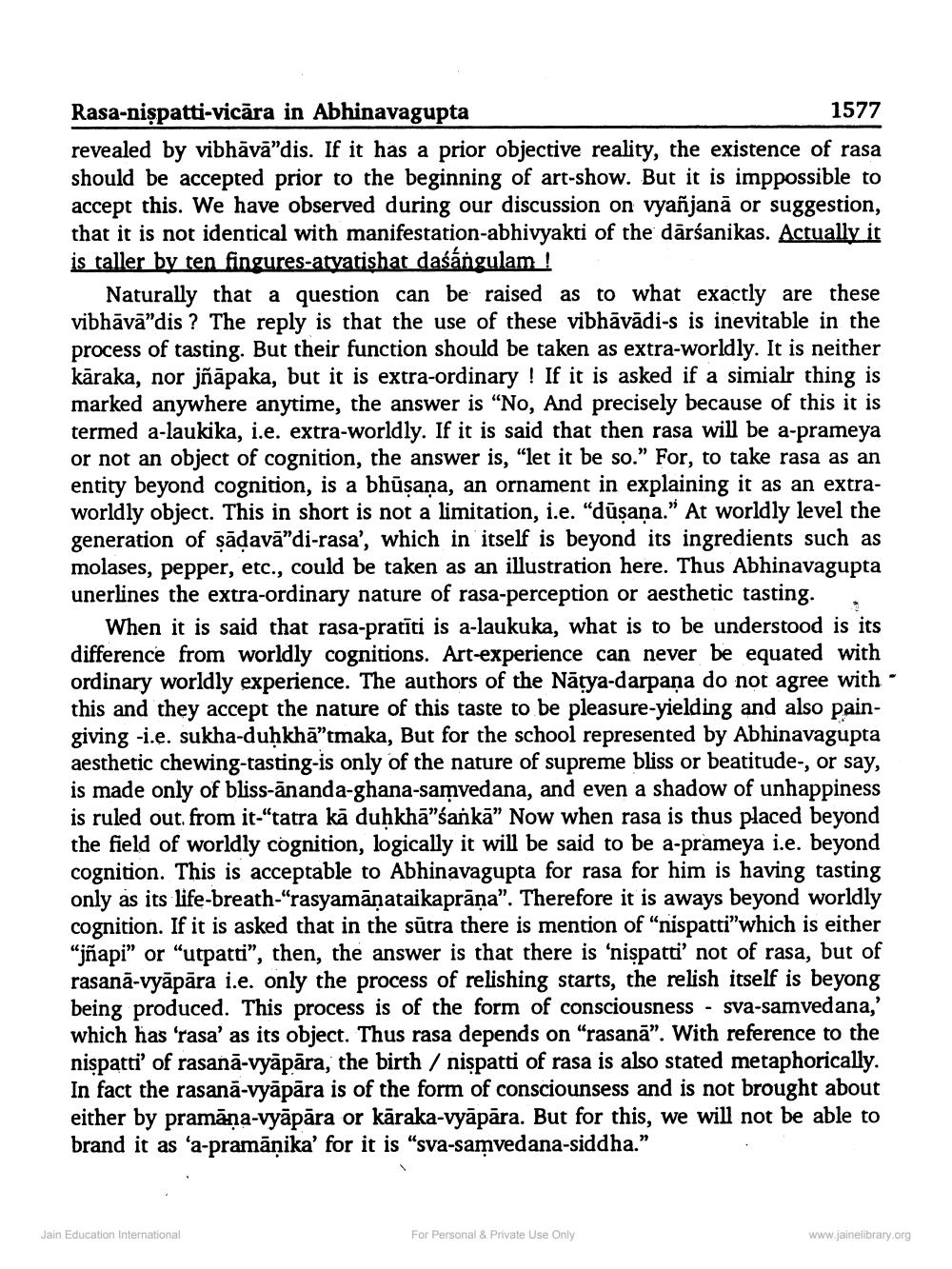________________
Rasa-nispatti-vicāra in Abhinavagupta
1577 revealed by vibhāvā"dis. If it has a prior objective reality, the existence of rasa should be accepted prior to the beginning of art-show. But it is imppossible to accept this. We have observed during our discussion on vyañjanā or suggestion, that it is not identical with manifestation-abhivyakti of the dārśanikas. Actually it is taller by ten fingures-aryatishat dasángulam !
Naturally that a question can be raised as to what exactly are these vibhāvā"dis ? The reply is that the use of these vibhāvādi-s is inevitable in the process of tasting. But their function should be taken as extra-worldly. It is neither kāraka, nor jñāpaka, but it is extra-ordinary ! If it is asked if a simialr thing is marked anywhere anytime, the answer is “No, And precisely because of this it is termed a-laukika, i.e. extra-worldly. If it is said that then rasa will be a-prameya or not an object of cognition, the answer is, “let it be so." For, to take rasa as an entity beyond cognition, is a bhūsana, an ornament in explaining it as an extraworldly object. This in short is not a limitation, i.e. "dūsana." At worldly level the generation of şādavā"di-rasa', which in itself is beyond its ingredients such as molases, pepper, etc., could be taken as an illustration here. Thus Abhinavagupta unerlines the extra-ordinary nature of rasa-perception or aesthetic tasting.
When it is said that rasa-pratīti is a-laukuka, what is to be understood is its difference from worldly cognitions. Art-experience can never be equated with ordinary worldly experience. The authors of the Nātya-darpana do not agree with this and they accept the nature of this taste to be pleasure-yielding and also paingiving -i.e. sukha-duhkhā"tmaka, But for the school represented by Abhinavagupta aesthetic chewing-tasting-is only of the nature of supreme bliss or beatitude-, or say, is made only of bliss-ānanda-ghana-samvedana, and even a shadow of unhappiness is ruled out from it-"tatra kā duhkhā"sankā” Now when rasa is thus placed beyond the field of worldly cognition, logically it will be said to be a-prameya i.e. beyond cognition. This is acceptable to Abhinavagupta for rasa for him is having tasting only as its life-breath-"rasyamāṇataikaprāna". Therefore it is aways beyond worldly cognition. If it is asked that in the sūtra there is mention of "nispatti" which is either "jñapi" or "utpatti", then, the answer is that there is 'nispatti' not of rasa, but of
asanā-vyāpāra i.e. only the process of relishing starts, the relish itself is beyong being produced. This process is of the form of consciousness - sva-samvedana,' which has 'rasa' as its object. Thus rasa depends on "rasanā”. With reference to the nispatti' of rasanā-vyāpāra, the birth / nispatti of rasa is also stated metaphorically. In fact the rasanā-vyāpāra is of the form of consciounsess and is not brought about either by pramāna-vyāpāra or kāraka-vyāpāra. But for this, we will not be able to brand it as 'a-pramānika' for it is "sva-samvedana-siddha."
Jain Education International
For Personal & Private Use Only
www.jainelibrary.org




